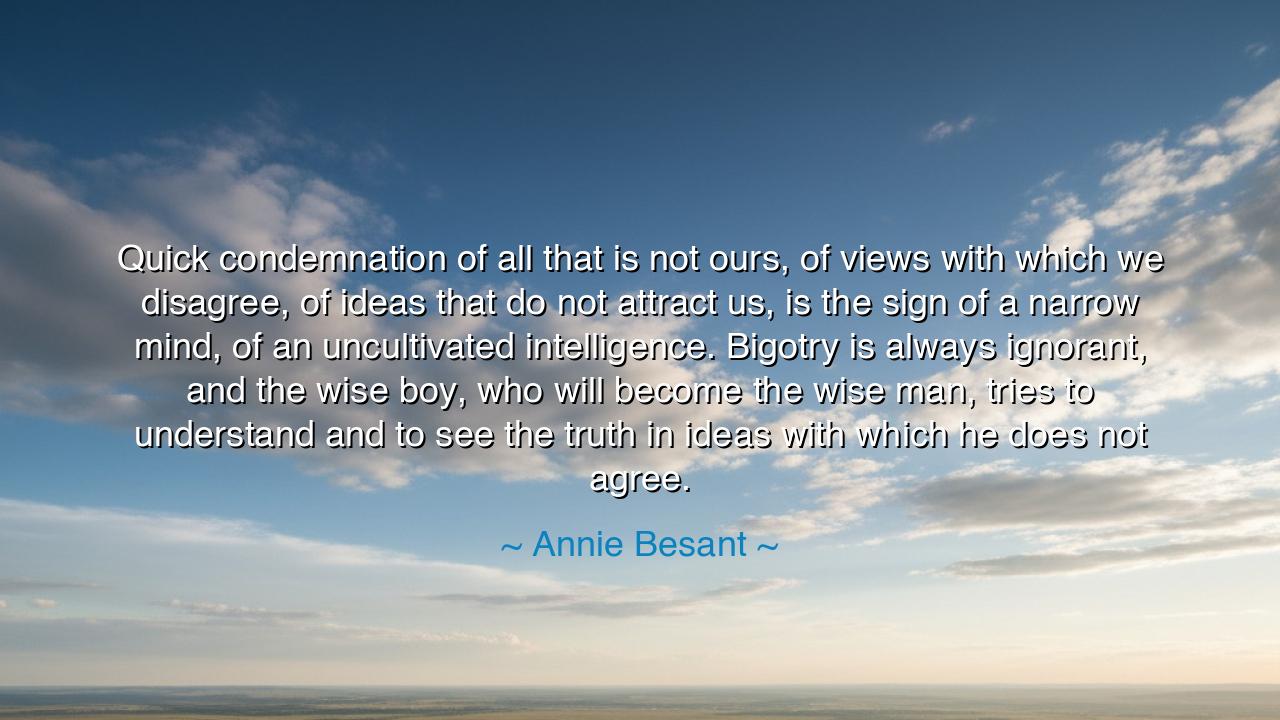
Quick condemnation of all that is not ours, of views with which
Quick condemnation of all that is not ours, of views with which we disagree, of ideas that do not attract us, is the sign of a narrow mind, of an uncultivated intelligence. Bigotry is always ignorant, and the wise boy, who will become the wise man, tries to understand and to see the truth in ideas with which he does not agree.






“Quick condemnation of all that is not ours, of views with which we disagree, of ideas that do not attract us, is the sign of a narrow mind, of an uncultivated intelligence. Bigotry is always ignorant, and the wise boy, who will become the wise man, tries to understand and to see the truth in ideas with which he does not agree.” Thus spoke Annie Besant, the philosopher, reformer, and torchbearer of wisdom who sought not division but enlightenment. Her words shine as a beacon for every age, for they teach that true intelligence is not in the loudness of our opinions, but in the depth of our understanding. She reminds us that to reject what we do not understand is to close the door to truth itself. For narrow-mindedness is not strength — it is fear wearing the mask of certainty.
In her time, Annie Besant was no stranger to conflict. Born in Victorian England, she challenged her society’s rigid traditions, its dogmas, its hierarchies. She questioned both Church and Empire, stood for the rights of workers, for women’s equality, and for India’s independence. She journeyed through theology, science, socialism, and mysticism, always seeking to grasp the essence of truth wherever it hid. Her quote springs from her own life’s journey — from a mind that refused to be confined by prejudice. For she had learned that every belief, no matter how foreign, carries within it a fragment of the greater reality, and that wisdom grows not from agreement, but from understanding.
To condemn quickly is the act of the small soul. It is the reflex of insecurity — the mind that fears its own uncertainty and therefore strikes down all difference as danger. Yet, the universe is vast, and truth is many-faced. The wise, as Besant teaches, do not fear diversity; they revere it. For in the clash of differing ideas lies the spark of revelation. A cultivated intelligence is like a great tree: it does not reject the winds that blow against it, but bends, learns, and grows stronger. To be wise is not to be certain of all things, but to be open to all things, discerning what is right through understanding, not through wrath.
History bears witness to this law. In the early days of science, Galileo Galilei stood before the Inquisition, accused of heresy for daring to say that the Earth moves around the Sun. The world condemned him swiftly, for his truth threatened their comfort. Yet time vindicated him, and those who condemned him are remembered not as defenders of faith, but as prisoners of ignorance. The same pattern repeats through every age — the prophets, the innovators, the artists, all meet resistance from those whose minds are closed. Yet from their courage, civilization advances. From their openness to new thought, the light of progress dawns.
Bigotry is always ignorant, Besant declares. It cannot see the world as whole, for it divides it into “ours” and “theirs.” It blinds itself to the truth that the human spirit — though expressed through countless languages, creeds, and cultures — seeks the same divine understanding. The wise soul, by contrast, learns to listen with humility. Even in ideas he does not accept, he seeks the grain of truth hidden beneath difference. He knows that to understand does not mean to surrender one’s beliefs, but to enrich them through empathy and reflection. The wise boy who listens rather than mocks will become the wise man who heals rather than divides.
From this truth springs a great and timeless lesson: that the mind must be both firm in principle and fluid in perception. Do not rush to condemn what seems strange. Do not scorn the words that unsettle your comfort. Ask instead, What truth might this contain? The greatest minds in history — from Buddha to Socrates, from Da Vinci to Einstein — all shared this trait: an infinite curiosity, a willingness to look beyond their own certainty. The moment you stop learning from others, you begin to wither within yourself.
Therefore, cultivate within you a generous mind — one that listens before judging, questions before condemning, and understands before rejecting. Seek out ideas that challenge you, for they are the forge in which wisdom is refined. Speak to those with whom you disagree, not to conquer them, but to learn from them. For the universe reveals its secrets not to the proud, but to the humble — not to the loud, but to the listening.
So let these words of Annie Besant echo in your heart: The wise do not fear difference; they are enlarged by it. The narrow mind sees an enemy where the open mind sees a teacher. And the one who seeks to understand even what he cannot accept becomes, in the end, a vessel of peace, a bearer of light, and a true citizen of the boundless kingdom of wisdom.






AAdministratorAdministrator
Welcome, honored guests. Please leave a comment, we will respond soon